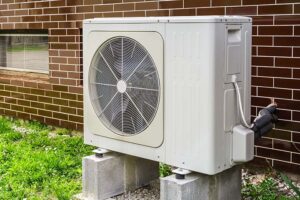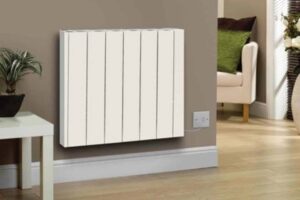Table of Contents
Replacing your outdated boiler system has become necessary, considering energy costs are going up and climate concerns are growing. Furthermore, your old system could be wasting money every day. This usually happens when:
- Your boiler is over 10 years old
- You notice higher gas or oil bills
- Your home feels cold despite the heating running
- You want to cut your carbon footprint
System boilers are the best solution for households looking to upgrade their heating system this year. This guide will explore what system boilers are and how they work in a central heating system and for separate hot water.
What Is a System Boiler?
A system boiler is a highly efficient type of central heating boiler that connects directly to your mains water supply while storing hot water in a separate cylinder. If you’re considering a new boiler, understanding how system boilers work is essential. The system boiler relies on key components:
- The main boiler unit that heats the water
- A hot water cylinder that stores heated water
- Built-in pump and expansion vessel
When your heating needs increase, a system boiler could be the perfect solution, especially for homes with multiple bathrooms or higher demand for hot water.
Air Source Heat Pump Grants
How Do System Boilers Work?
Here’s how system boilers work in detail:
- Cold mains water enters the system’s boiler
- The gas boiler heats this water efficiently
- Some hot water circulates to your radiators for central heating
- The rest goes to the hot water cylinder for storage
- When you turn on a tap, hot water comes from the cylinder, not directly from the boiler
System boilers use a pressurised heating circuit that doesn’t require a header tank in the loft. This enclosed hot water system makes for a neater installation while maintaining consistent performance.
Installing a system boiler is generally simpler than setting up a heat-only boiler, as there’s less pipework needed.
System Boilers vs Other Boiler Types
When considering a new system boiler, it’s important to understand how it compares to other options:
System Boiler vs Combi Boiler
While combi boilers are suitable for smaller homes, they have limitations. A system boiler isn’t bound by the same constraints:
- System boilers provide hot water to multiple bathrooms without pressure drops
- Combi boilers heat water on demand but may struggle with simultaneous usage
- System boilers take up more space than a combi boiler due to the cylinder
- Combi boilers are more compact but less suitable for high-demand households
System Boiler vs Regular Boiler
The conventional boiler (also called a regular boiler or heat-only boiler) represents older technology:
- System boilers eliminate the need for a water tank in the loft
- Regular boilers require both a cold water feed tank and an expansion tank
- System boilers are more commonly installed in modern properties
- Regular boilers work best in older homes with existing traditional setups
Government Boiler Grant Schemes Available in 2025
In 2025, homeowners and landlords can get help through schemes like the Boiler Upgrade Scheme (BUS) and Energy Company Obligation (ECO). These programs mean you can install modern, clean heating for less money.
1. Boiler Upgrade Scheme (BUS)
The BUS program helps homeowners move away from fossil fuels. Your heating system could be replaced with help from this scheme. This happens when:
- You own a property in England or Wales
- Your current system runs on gas, oil, or coal
- You want to install a heat pump or biomass boiler
The BUS status is active throughout 2025. When you apply for BUS funding, you could receive:
- Up to £7,500 toward heat pump installation
- £5,000 for a biomass boiler system
These amounts make clean heating much more affordable. The BUS means on your budget that the financial barrier is much lower. When you see these figures, it’s often just the beginning of your overall savings through reduced bills.
2. Energy Company Obligation (ECO)
If your income is lower, the ECO scheme might help you. Many people think only homeowners with money can upgrade. But ECO focuses on helping those who need it most. This program targets:
- Low-income households
- People receiving certain benefits
- Homes with poor energy efficiency
The ECO status covers both heating systems and insulation. Your home might qualify for:
- A new, efficient boiler
- Improved loft insulation
- Wall cavity filling
- Other energy-saving measures
ECO means your energy supplier helps pay for these upgrades. The scheme is designed to cut energy poverty while reducing carbon emissions. If you see you might qualify, it’s worth exploring this option first.
How Much Do System Boilers Cost?
A system boiler’s cost typically ranges from £600 to £2,500 for the unit alone. A complete system boiler installed by a qualified engineer might cost between £1,800 and £3,500 in total.
This investment provides value when you consider:
- Long-term energy savings on your heating bills
- Reliable hot water for your entire household
- Improved home comfort year-round
- Potential increase in property value
What to Expect While Installing a System Boiler?
While combi boilers are often marketed as DIY-friendly, installing a system boiler requires professional expertise. Because system boilers provide hot water through a more complex setup that demands professional installation.
The installation process for a system boiler typically includes:
- Assessment of heating and hot water needs
- Removal of existing boiler type
- Installation of the new boiler system
- Connection to your hot water cylinder and the radiator system
- Testing the pressurised heating circuit
- Final checks and commissioning
Unlike a combi, a system boiler relies on its water storage cylinder to deliver consistent hot water. This means providing space for both components. The cylinder carries the central heating water at high pressure, ensuring a steady flow throughout your home.
System Boilers Available: Choosing the Best System
With many system boilers available on the market, selecting the right one can feel overwhelming. The best system boiler for your home depends on several factors:
- Size of your property
- Number of bathrooms
- Typical demand for hot water
- Available space for the cylinder
- Budget constraints
When comparing models, look for:
- Energy efficiency ratings (A-rated boilers save the most money)
- Warranty length (some premium models offer up to 10 years)
- Customer reviews and reliability records
- Compatibility with smart controls for optimised performance
The Advantages of System Boilers in 2025
System boilers provide hot water and heating with remarkable efficiency, especially when installed under government grant schemes. Here’s why system boilers work best for many homeowners in 2025:
Perfect for Higher-Demand Households
If your household frequently uses hot water simultaneously from different outlets, a system boiler would be the ideal solution. Unlike a combi boiler due to its instantaneous heating design, system boilers store hot water ready for use whenever needed.
This makes system boilers perfect for:
- Homes with multiple bathrooms
- Families with overlapping schedules
- Properties where consistent water pressure is essential
- Households with high demand for heating and hot water
Space Efficiency vs Conventional Systems
The space that a system boiler requires is well worth it for the performance benefits. frees up space by eliminating the need for a cold water tank and expansion tank in the attic.
Integration with Renewable Energy
Modern system boilers are increasingly designed to work alongside renewable energy sources. If you’re environmentally conscious, a system boiler could be integrated with:
- Solar thermal panels
- Heat pumps
- Biomass systems
This compatibility makes system boilers future-proof as we transition toward greener energy solutions. Your system boiler could be partially powered by renewable sources, reducing both carbon emissions and ongoing costs.
Wrapping It UP
With energy prices continuing to rise and environmental concerns growing, upgrading to an efficient system boiler makes both financial and ecological sense.
System boilers work best for households with moderate to high hot water demands, providing reliable performance without the limitations of other boiler types.
Government grants make 2025 an excellent time to make the switch, potentially saving thousands on installation costs.
Whether you’re replacing an old system boiler or converting from a different type, the available support makes efficient heating more accessible than ever.
Frequently Asked Questions
If you have a hot water cylinder but no water tank in the loft, you probably have a system boiler. It also doesn’t need a cold water tank like a regular boiler.
A system boiler is usually found in the kitchen, utility room, or an airing cupboard—anywhere with enough space and ventilation.
Yes, system boilers have a heat exchanger. It helps transfer heat from the burner to the water that heats your home.
The pump is built inside the boiler unit itself. It pushes hot water through your radiators and to the hot water cylinder.



